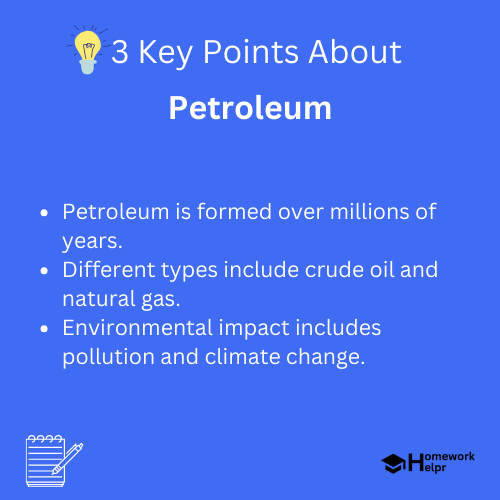📝 Summary
Petroleum, known as black gold, is a crucial energy source composed of hydrocarbons and other organic materials. Formed over millions of years through the decomposition of marine organisms, its main types include crude oil, natural gas, and various refined products. The petroleum industry plays a significant role in the global economy, impacting essential sectors such as transportation, manufacturing, and electricity generation. However, petroleum extraction and usage also pose environmental challenges, including pollution, climate change, and habitat destruction. Innovations and a focus on renewable energy suggest a transformative future for petroleum.
Understanding Petroleum: The Black Gold
Petroleum, often called black gold, is a naturally occurring liquid found beneath the Earth’s surface. It is composed of hydrocarbons and other organic materials and plays a crucial role in our daily lives. From fueling our cars to producing electricity, petroleum is an essential energy source and a major raw material for various industries.
Definition
Hydrocarbons: Organic compounds made up of hydrogen and carbon, main constituents of petroleum. Organic materials: Substances derived from living organisms.
The Formation of Petroleum
The formation of petroleum is a complex geological process that takes millions of years. It begins with the accumulation of organic debris, primarily from marine organisms, on the ocean floor. Over time, layers of sediment bury this organic matter, subjecting it to heat and pressure. This process transforms the remains into hydrocarbons through chemical reactions.
This transformation occurs in three main stages:
- Diagenesis: Initial decay of organic matter, resulting in kerogen formation.
- Catalytic conversion: Kerogen transforms into liquid or gaseous hydrocarbons under intense pressure and heat.
- Maturation: The hydrocarbons continue to evolve based on depth, temperature, and time, forming crude oil and natural gas.
Examples
Example: Think of the process like making tea. The leaves steep in hot water, extracting flavors over time; similarly, organic materials are heated and compressed, extracting hydrocarbons.
Types of Petroleum
Petroleum is not a one-size-fits-all substance; it comes in various forms and is categorized into several types based on its composition, density, and viscosity:
- Crude oil: Unrefined oil that can be further processed to create fuels.
- Natural gas: Primarily methane, this gas is often found alongside crude oil.
- Refined products: These include gasoline, diesel, kerosene, and jet fuel, produced through refining processes.
The characteristics of each type determine its utility and how it can be used effectively in various applications.
The Importance of Petroleum
Petroleum is vital to our economy and lifestyle. Its significance can be understood by examining its diverse applications:
- Transportation: Fuels like gasoline and diesel power vehicles, airplanes, and ships.
- Electricity generation: Petroleum can be combusted to generate electricity.
- Manufacturing: Many plastic products, synthetic materials, and chemicals originate from petroleum.
In short, the influence of petroleum is far-reaching and impacts various sectors of the economy.
❓Did You Know?
Did you know that the world produces over 4 billion tons of oil every year? This immense quantity fuels the global demand for energy!
The Petroleum Industry
The petroleum industry is one of the largest and most influential sectors in the world. It encompasses the exploration, extraction, refining, and marketing of petroleum products. Key components include:
- Exploration: Searching for oil reserves using various techniques, including seismic surveys.
- Extraction: The process of oil drilling, where oil is pumped from below the ground.
- Refining: The conversion of crude oil into usable products like gasoline and diesel.
Each phase plays a critical role in the overall functioning of the petroleum sector, creating jobs and economic opportunities worldwide.

Environmental Impact of Petroleum
While petroleum is vital, its extraction, production, and use come with significant environmental concerns:
- Pollution: Oil spills can devastate marine ecosystems and wildlife.
- Climate change: Burning fossil fuels like petroleum contributes to greenhouse gas emissions.
- Habitat destruction: Drilling and extraction activities disrupt local habitats.
Addressing these challenges is essential for sustainable energy practices and environmental protection.
The Future of Petroleum
As the world evolves, the future of petroleum faces numerous challenges and opportunities. The increasing focus on renewable energy sources, such as solar and wind power, is reshaping the energy landscape. However, petroleum remains indispensable in the foreseeable future.
Innovations in technology, including carbon capture and more efficient refining methods, aim to mitigate environmental impacts. Future trends may also see a shift toward alternatives, such as biofuels or synthetic fuels derived from non-petroleum sources.
Examples
Example: Biofuels made from crops like corn or sugarcane serve as renewable energy sources, offering an environmentally friendly alternative to traditional petroleum fuels.
Conclusion
In conclusion, petroleum is an intricately woven part of our daily lives, with applications spanning from transportation to manufacturing. While its economic benefits are substantial, it is crucial to recognize the potential environmental repercussions. As we strategize for a more sustainable future, understanding the dynamics of petroleum and its alternatives will be paramount. By balancing our energy needs and environmental responsibilities, we can ensure a brighter tomorrow.
With ongoing research and innovation, the next chapter of petroleum‚’ story is yet to be written.
Related Questions on Petroleum
What is petroleum often called?
Answer: Petroleum is often called black gold.
How is petroleum formed?
Answer: Petroleum is formed from marine organisms’ remains.
What are the types of petroleum?
Answer: Types include crude oil, natural gas, and refined products.
What is the environmental impact of petroleum?
Answer: It includes pollution, climate change, and habitat destruction.
